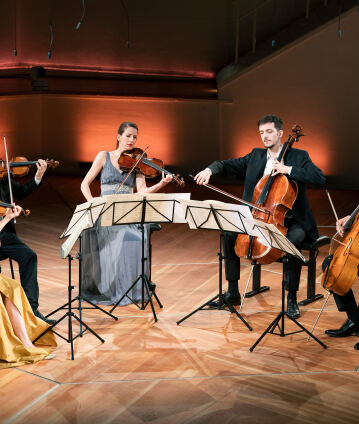“Schubert Marathon” – Part 3

Schubert’s chamber music is a world of its own. In our Schubert Marathon, Berliner Philharmoniker ensembles explore the musical landscapes of the composer’s soul. Perhaps his most radical instrumental work is the String Quartet No. 15. Harmonically expansive and marked by extreme contrasts, it vacillates between hope and despair. The programme concludes with Schubert’s beautiful and highly dramatic string quintet, a chamber music swan song.
Franz Schubert’s early death at the age of just 31 has often been described as a “catastrophe for music history” – we would love to have known how his style would have developed. Schubert himself did not live to see many performances of his works, especially his late works – if you can call them that. The first movement of his last string quartet was probably performed in Vienna on 26 March 1828. At that time, on the first anniversary of Beethoven’s death, what was known as a “private concert” took place which featured exclusively works by Schubert. The G major quartet, like the quintet in C major which was composed somewhat later, is one of the composer’s most demanding scores. The conflict between major and minor is established right at the beginning, and is only resolved after great effort in favour of major at the end of the first and slow movements. While a ländler theme in the middle section of the scherzo promises relief from the sombre mood, the fast-paced finale surprises with a propulsive character and unpredictable harmonic twists.
The last great work that Schubert was able to complete was his String Quintet in C major, which concludes our marathon. Unlike most composers before him, Schubert added a second cello to the string quartet instrumentation rather than a second viola. The expansion of the lower register contributes to the depth of sound, and enables the composer to present the poignant second theme of the first movement first as a cello and then as a violin duet. Schubert’s “heavenly lengths”, which Robert Schumann spoke of, are the result of the extended themes that meander through different keys and are constantly illuminated in new ways by the instrumentation.
© 2024 Berlin Phil Media GmbH
Related interviews
Category
Artists
Our recommendations
- “Beethoven in close-up” – part 3
- An evening of chamber music with Christian Tetzlaff and members of the Berliner Philharmoniker
- Birthday concert of the 12 Cellists of the Berliner Philharmoniker
- Octets by Franz Schubert and Jörg Widmann
- The Berlin Phil Series: A tribute to Daniel Stabrawa
- Philharmonic String Quartet: Music of remembrance